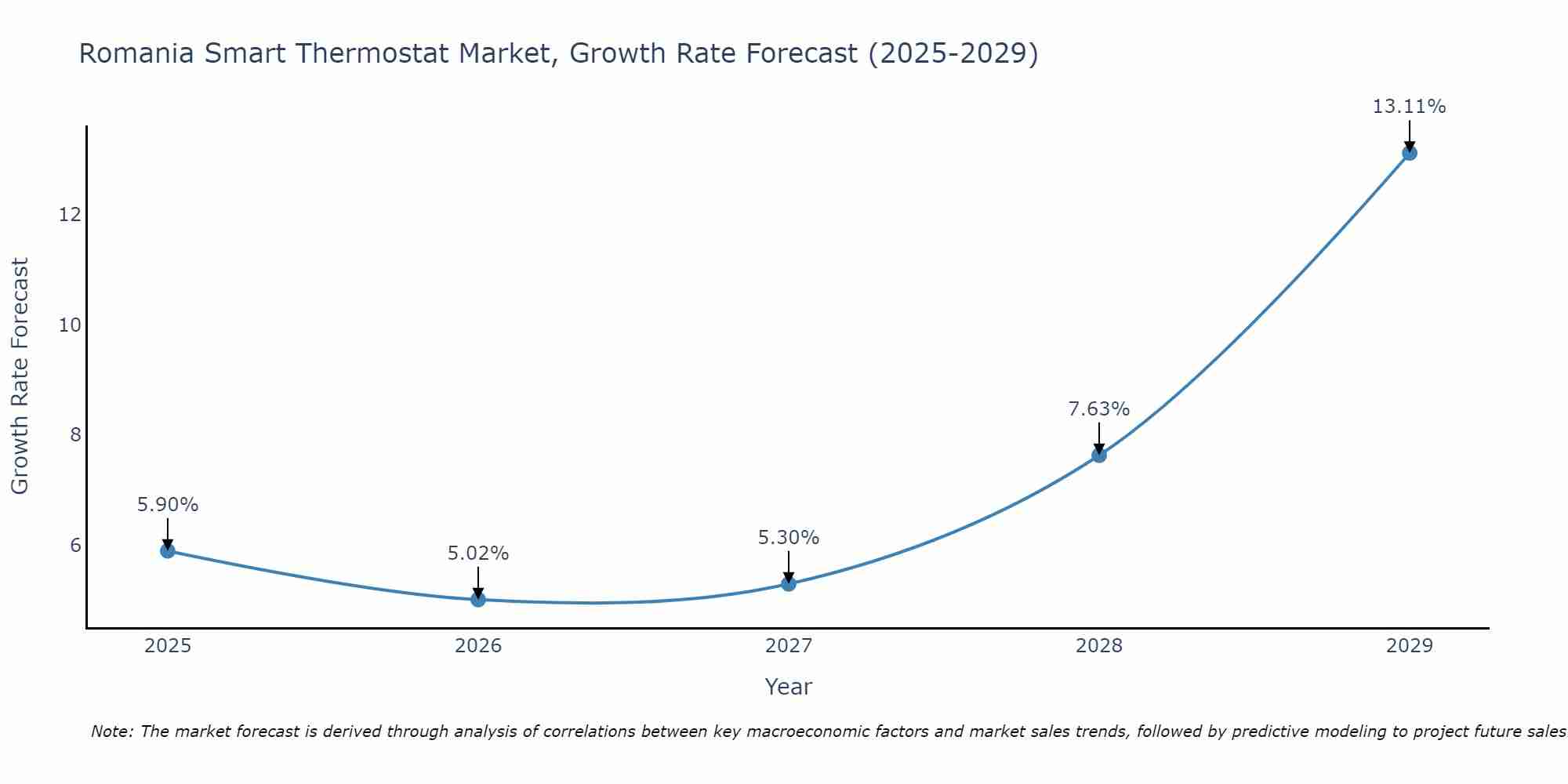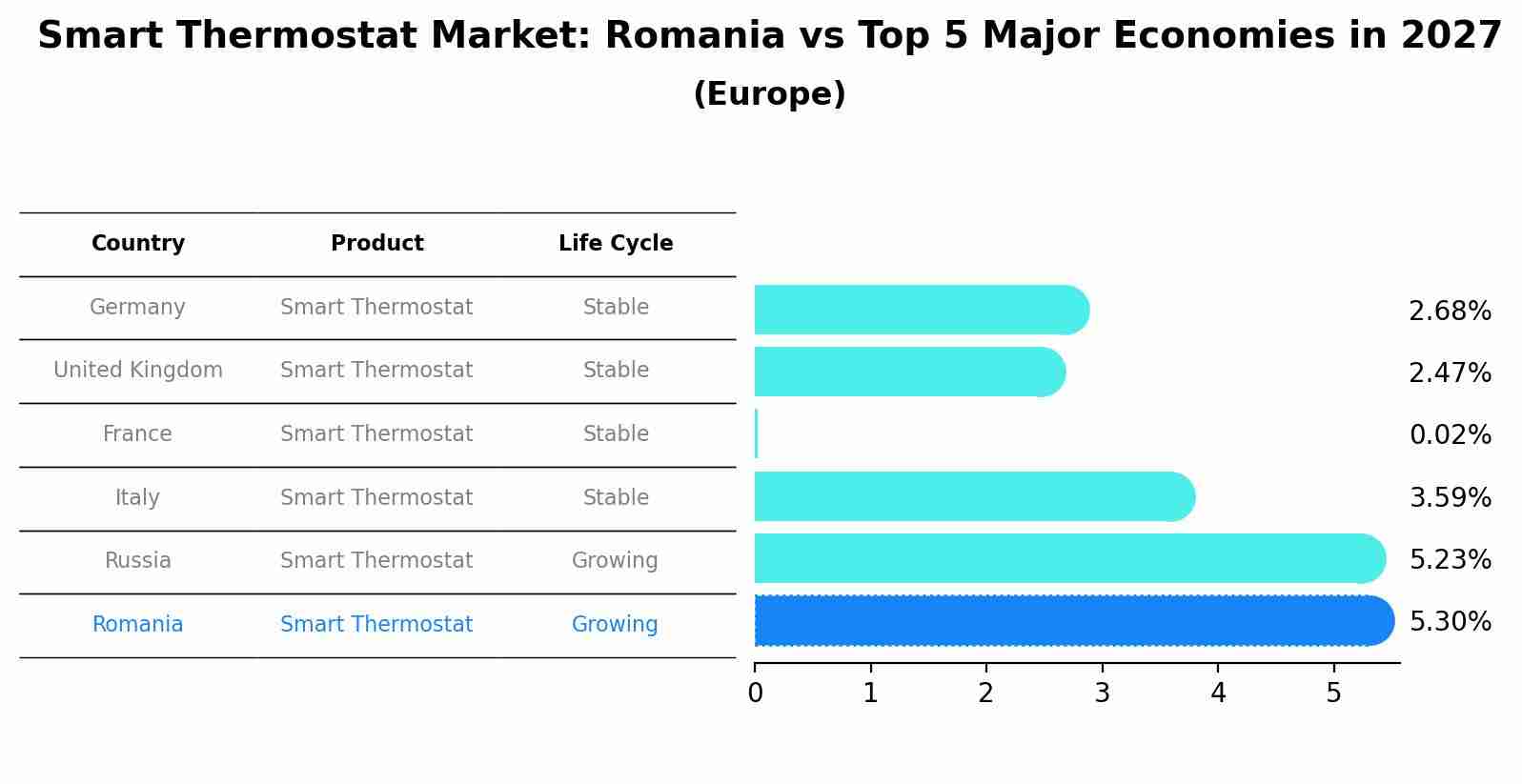Romania Smart Thermostat Market Outlook | Forecast, Analysis, Share, COVID-19 IMPACT, Industry, Value, Size, Revenue, Growth, Companies & Trends
| Product Code: ETC369498 | Publication Date: Aug 2022 | Updated Date: Jul 2025 | Product Type: Market Research Report | |
| Publisher: 6Wresearch | Author: Vasudha | No. of Pages: 75 | No. of Figures: 35 | No. of Tables: 20 |
Romania Smart Thermostat Market Size Growth Rate
The Romania Smart Thermostat Market is projected to witness mixed growth rate patterns during 2025 to 2029. Commencing at 5.90% in 2025, growth builds up to 13.11% by 2029.

Smart Thermostat Market: Romania vs Top 5 Major Economies in 2027 (Europe)
In the Europe region, the Smart Thermostat market in Romania is projected to expand at a growing growth rate of 5.30% by 2027. The largest economy is Germany, followed by United Kingdom, France, Italy and Russia.

Romania Smart Thermostat Market Synopsis
The Romania Smart Thermostat Market is experiencing steady growth driven by increasing awareness of energy efficiency, rising disposable income, and government initiatives promoting smart home solutions. Smart thermostats offer benefits such as remote access, energy savings, and personalized comfort, making them increasingly popular among consumers. Key players in the market are introducing innovative features like voice control, learning algorithms, and integration with smart home ecosystems to stay competitive. The market is also witnessing partnerships between manufacturers and energy companies to promote the adoption of smart thermostats. While the market is still in its early stages, it is expected to expand further as consumers seek ways to optimize their energy consumption and reduce utility bills through smart technologies.
Romania Smart Thermostat Market Trends
The Romania Smart Thermostat Market is witnessing a growing demand for energy-efficient solutions driven by increasing awareness about environmental sustainability and cost savings. Consumers are increasingly adopting smart thermostats due to their ability to optimize energy usage, provide remote access and control, and offer personalized heating and cooling schedules. Integration with smart home ecosystems and the rise of IoT technology are also influencing market growth. Key players are focusing on introducing innovative features such as voice control, geofencing, and AI-based algorithms to enhance user experience. Additionally, government initiatives promoting energy efficiency and the expansion of smart infrastructure in Romania are expected to further boost the adoption of smart thermostats in the coming years.
Romania Smart Thermostat Market Challenges
In the Romania Smart Thermostat Market, some key challenges include low awareness and adoption rates among consumers, limited compatibility with older heating systems, and concerns regarding data privacy and security. Many consumers in Romania are not fully aware of the benefits of smart thermostats or how they can help save energy and reduce heating costs. Additionally, compatibility issues with older heating systems can hinder the widespread adoption of smart thermostats in older homes. Furthermore, there are concerns about the security of data collected by smart thermostats, as personal information and household usage data may be vulnerable to hacking or misuse. Overcoming these challenges will require education campaigns, technological innovations, and robust data protection measures to increase consumer trust and drive market growth.
Romania Smart Thermostat Market Investment Opportunities
The Romania Smart Thermostat Market offers promising investment opportunities due to the increasing focus on energy efficiency and smart home technologies in the country. With the rising awareness of environmental sustainability and the need to reduce energy consumption, the demand for smart thermostats is expected to grow. Investors can capitalize on this trend by investing in companies that manufacture or distribute smart thermostat products in Romania, as well as companies offering smart home integration services. Additionally, there is potential for partnerships with utility companies to promote energy-saving programs that incentivize the adoption of smart thermostats. Overall, the Romania Smart Thermostat Market presents a lucrative investment landscape driven by technological advancements and a growing emphasis on energy conservation.
Jordan Agar Market Government Policies
In Romania, the government has implemented various policies to promote energy efficiency and the adoption of smart thermostats. These policies include financial incentives such as grants and subsidies for households and businesses investing in energy-efficient technologies like smart thermostats. Additionally, the government has introduced regulations that require new buildings to be equipped with energy-efficient heating systems, including smart thermostats. There are also initiatives aimed at raising awareness among consumers about the benefits of smart thermostats in reducing energy consumption and carbon emissions. Overall, the government`s policies are focused on driving the adoption of smart thermostats to improve energy efficiency and sustainability in Romania.
Romania Smart Thermostat Market Future Outlook
The future outlook for the Romania Smart Thermostat Market appears promising, driven by increasing awareness of energy efficiency and the growing trend towards smart home automation. Factors such as the rising adoption of IoT technology, government initiatives promoting energy conservation, and the increasing demand for convenient and energy-saving solutions are expected to propel market growth. The integration of smart thermostats with AI technology and voice assistants further enhances their appeal to consumers. Additionally, the ongoing digital transformation in the residential sector and the availability of innovative smart thermostat models are likely to fuel market expansion. Overall, the Romania Smart Thermostat Market is anticipated to witness substantial growth in the coming years as consumers seek to optimize energy usage and enhance home comfort through intelligent heating and cooling solutions.
Key Highlights of the Report:
- Romania Smart Thermostat Market Outlook
- Market Size of Romania Smart Thermostat Market, 2021
- Forecast of Romania Smart Thermostat Market, 2031
- Historical Data and Forecast of Romania Smart Thermostat Revenues & Volume for the Period 2018 - 2031
- Romania Smart Thermostat Market Trend Evolution
- Romania Smart Thermostat Market Drivers and Challenges
- Romania Smart Thermostat Price Trends
- Romania Smart Thermostat Porter's Five Forces
- Romania Smart Thermostat Industry Life Cycle
- Historical Data and Forecast of Romania Smart Thermostat Market Revenues & Volume By Type for the Period 2018 - 2031
- Historical Data and Forecast of Romania Smart Thermostat Market Revenues & Volume By Wireless for the Period 2018 - 2031
- Historical Data and Forecast of Romania Smart Thermostat Market Revenues & Volume By Wireless for the Period 2018 - 2031
- Historical Data and Forecast of Romania Smart Thermostat Market Revenues & Volume By End-User Vertical for the Period 2018 - 2031
- Historical Data and Forecast of Romania Smart Thermostat Market Revenues & Volume By Residential for the Period 2018 - 2031
- Historical Data and Forecast of Romania Smart Thermostat Market Revenues & Volume By Commercial for the Period 2018 - 2031
- Romania Smart Thermostat Import Export Trade Statistics
- Market Opportunity Assessment By Type
- Market Opportunity Assessment By End-User Vertical
- Romania Smart Thermostat Top Companies Market Share
- Romania Smart Thermostat Competitive Benchmarking By Technical and Operational Parameters
- Romania Smart Thermostat Company Profiles
- Romania Smart Thermostat Key Strategic Recommendations
Frequently Asked Questions About the Market Study (FAQs):
- Single User License$ 1,995
- Department License$ 2,400
- Site License$ 3,120
- Global License$ 3,795
Search
Thought Leadership and Analyst Meet
Our Clients
Related Reports
- Canada Oil and Gas Market (2026-2032) | Share, Segmentation, Value, Industry, Trends, Forecast, Analysis, Size & Revenue, Growth, Competitive Landscape, Outlook, Companies
- Germany Breakfast Food Market (2026-2032) | Industry, Share, Growth, Size, Companies, Value, Analysis, Revenue, Trends, Forecast & Outlook
- Australia Briquette Market (2025-2031) | Growth, Size, Revenue, Forecast, Analysis, Trends, Value, Share, Industry & Companies
- Vietnam System Integrator Market (2025-2031) | Size, Companies, Analysis, Industry, Value, Forecast, Growth, Trends, Revenue & Share
- ASEAN and Thailand Brain Health Supplements Market (2025-2031) | Strategy, Consumer Insights, Analysis, Investment Trends, Opportunities, Growth, Size, Share, Industry, Revenue, Segments, Value, Segmentation, Supply, Forecast, Restraints, Outlook, Competition, Drivers, Trends, Demand, Pricing Analysis, Competitive, Strategic Insights, Companies, Challenges
- ASEAN Bearings Market (2025-2031) | Strategy, Consumer Insights, Analysis, Investment Trends, Opportunities, Growth, Size, Share, Industry, Revenue, Segments, Value, Segmentation, Supply, Forecast, Restraints, Outlook, Competition, Drivers, Trends, Demand, Pricing Analysis, Competitive, Strategic Insights, Companies, Challenges
- Europe Flooring Market (2025-2031) | Outlook, Share, Industry, Trends, Forecast, Companies, Revenue, Size, Analysis, Growth & Value
- Saudi Arabia Manlift Market (2025-2031) | Outlook, Size, Growth, Trends, Companies, Industry, Revenue, Value, Share, Forecast & Analysis
- Uganda Excavator, Crane, and Wheel Loaders Market (2025-2031) | Strategy, Consumer Insights, Analysis, Investment Trends, Opportunities, Growth, Size, Share, Industry, Revenue, Segments, Value, Segmentation, Supply, Forecast, Restraints, Outlook, Competition, Drivers, Trends, Demand, Pricing Analysis, Competitive, Strategic Insights, Companies, Challenges
- Rwanda Excavator, Crane, and Wheel Loaders Market (2025-2031) | Strategy, Consumer Insights, Analysis, Investment Trends, Opportunities, Growth, Size, Share, Industry, Revenue, Segments, Value, Segmentation, Supply, Forecast, Restraints, Outlook, Competition, Drivers, Trends, Demand, Pricing Analysis, Competitive, Strategic Insights, Companies, Challenges
Industry Events and Analyst Meet
Whitepaper
- Middle East & Africa Commercial Security Market Click here to view more.
- Middle East & Africa Fire Safety Systems & Equipment Market Click here to view more.
- GCC Drone Market Click here to view more.
- Middle East Lighting Fixture Market Click here to view more.
- GCC Physical & Perimeter Security Market Click here to view more.
6WResearch In News
- Doha a strategic location for EV manufacturing hub: IPA Qatar
- Demand for luxury TVs surging in the GCC, says Samsung
- Empowering Growth: The Thriving Journey of Bangladesh’s Cable Industry
- Demand for luxury TVs surging in the GCC, says Samsung
- Video call with a traditional healer? Once unthinkable, it’s now common in South Africa
- Intelligent Buildings To Smooth GCC’s Path To Net Zero


















